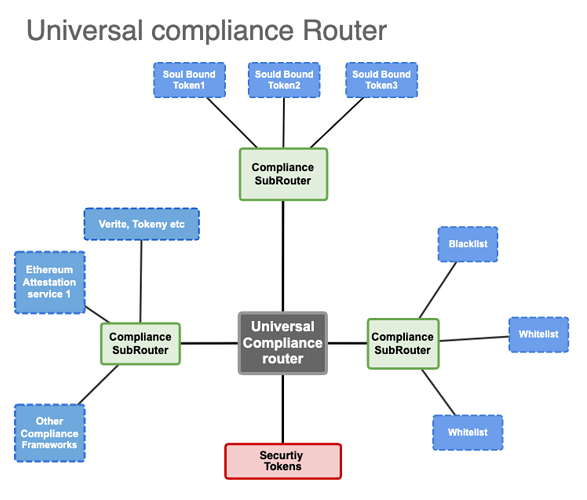Discussion topic for ERC-7972, RWA’s: Universal compliance router for RWA’s(security tokens) · ERC-7972: Universal Compliance Router for RWA's by deepanshu179 · Pull Request #1087 · ethereum/ERCs · GitHub
Summary:
The Universal Compliance Router (ERC-7972) is a smart contract middleware that enables modular, jurisdiction-aware and can be extended to check kyc level etc. for tokenized Real-World Assets (RWAs). It integrates seamlessly with:
- DIDs (Decentralized Identifiers) for universal identity resolution
- OnchainID for verified, on-chain identity and compliance metadata
- Soulbound Tokens (SBTs) to represent non-transferable credentials like KYC, accreditation, or residency
- On-chain compliance modules (e.g., KYC/AML, investor limits, blacklists)
Key Benefits:
- Plug-and-play compliance
- Interoperability: Works across ecosystems and identity providers
- Dynamic enforcement: Uses
staticcallto run checks without altering state
This router acts as the trust layer for compliant RWA tokenization, enabling secure, scalable, and globally interoperable asset issuance and transfer
Motivation:
Tokenized RWAs such as real estate, equities, and bonds must comply with jurisdictional regulations (e.g., KYC/AML, accredited investor status). Hardcoding compliance logic into token contracts is inflexible and non-scalable. This ERC proposes a universal router that:
- Supports modular compliance logic
- Enables jurisdiction-specific enforcement
- Allows dynamic updates to compliance rules
- Promotes reuse of compliance modules across ecosystems
Note: The interface and implementation can be extended to include KYC levels and other KYC/AML checks as parameters in the isCompliant function. The core idea is to allow the registration of compliance frameworks or sub-proxies within the Universal Compliance Router, each exposing a unified callable selector for a specific category of compliance contracts.The registered sub-router/proxy or compliance contract counts in the Universal Compliance Router should be optimized to reduce the computational cost associated with looping operations.
Rationale:
On-chain compliance solutions for real-world assets (RWAs) are currently fragmented across different protocols and implementations. Each project often creates its own logic for enforcing regulatory requirements like KYC, AML, or jurisdictional restrictions. This siloed development leads to:
- Lack of interoperability between compliance mechanisms across protocols
- Duplication of effort in building and auditing similar compliance logic
- Barriers to composability, preventing seamless integration between token contracts, marketplaces, and identity providers
The UniversalComplianceRouter consolidates these disparate efforts by introducing a standardized, modular interface to manage and invoke compliance checks. Instead of enforcing rules in isolation, this router allows smart contracts to delegate compliance verification to dynamically registered modules, each responsible for a specific rule set (e.g., “US Accredited Investor”, “EU Retail AML”, etc.).
By standardizing how compliance modules are invoked—using staticcall to ensure safety and composability—this router enables:
- Composable compliance checks that can be reused across assets and jurisdictions
- Dynamic rule updates without upgrading token contracts or duplicating logic
- Shared infrastructure that fosters cooperation between identity providers, compliance vendors, and token issuers
This approach promotes network effects within EVM ecosystems, allowing compliant actors to interoperate with one another through a common compliance routing standard. As adoption grows, so does the value and utility of each registered module, creating a compounding benefit for the broader on-chain RWA ecosystem.
Update Log
- 2025-06-16: review
- 2025-06-16: ERC-7972 number assigned
External Reviews
None as of 2025-06-16.
Outstanding Issues
None as of 2025-06-16.
